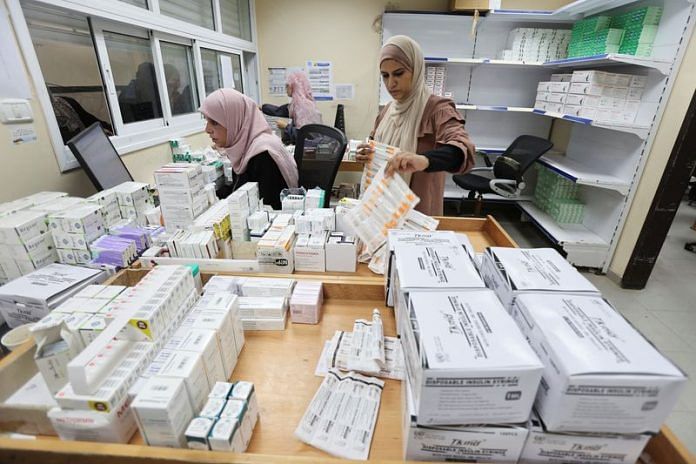(Reuters) – Israeli lawmakers on Monday voted to ban the U.N. agency for Palestinian refugees, UNRWA, from operating within Israel, alarming some of Israel’s Western allies who fear this will further worsen the already dire humanitarian situation in Gaza.
Here are some facts about UNRWA:
WHAT DOES UNRWA DO?
UNRWA (United Nations Relief and Works Agency for Palestine Refugees in the Near East) was established in 1949 by a U.N. General Assembly resolution, following the war surrounding the founding of Israel, when 700,000 Palestinians fled or were driven from their homes.
Today it directly employs 30,000 Palestinians across the region, serving the civic and humanitarian needs of 5.9 million descendants of those refugees, in the Gaza Strip, West Bank and in vast camps in neighbouring Arab countries.
In Gaza, it employs 13,000 people, running the enclave’s schools, its primary healthcare clinics and other social services, as well as distributing humanitarian aid. Its services in Gaza have increased in importance since 2005, when Israel and Egypt imposed a blockade causing an economic collapse with one of the highest unemployment rates in the world.
Since Israel launched its war following the Oct. 7, 2023 attacks, hundreds of thousands of Gazans have been sheltering in UNRWA schools, clinics and other public buildings.
Nearly the entire Gazan population now relies on UNRWA for basic necessities, including food, water and hygiene supplies.
At least 220 UNRWA staff have been killed since the start of the conflict, making it the deadliest conflict ever for U.N. employees.
WHO ARE ITS MAIN DONORS?
Contributions from United Nations member states, including regional governments and the European Union, account for most of the agency’s funding. It also receives funding from the regular U.N. budget and financial contributions from other U.N. bodies.
In 2022, its top government donors were the United States, Germany, the European Union, Sweden, Norway, Japan, France, Saudi Arabia, Switzerland and Turkey.
Countries including the United States, Britain, Germany, Italy, the Netherlands and Switzerland suspended their funding of the agency when allegations emerged in January that around 12 of UNRWA’s Palestinian employees were suspected of involvement in the Oct. 7 attacks. Many have restored funding since.
WHAT ARE ISRAEL’S ALLEGATIONS?
The United Nations launched an investigation after Israel charged that 12 UNRWA staff took part in the Hamas-led attacks that triggered the Gaza war. Seven more cases were brought to the U.N.’s attention in March and April.
In August, the United Nations said that nine UNRWA staff members may have been involved in the Oct. 7 attacks – in which some 1,200 people were killed and more than 250 taken hostage – and had been fired.
Prime Minister Benjamin Netanyahu has said the number of UNRWA staff that participated in the raid was 13.
An Israeli dossier in January, which was shared with the United States and reviewed by Reuters, said Israel also had wider evidence that UNRWA has employed 190 Hamas and Islamic Jihad militants.
WHAT IMPACT COULD THE ISRAELI BAN HAVE?
UNRWA head Philippe Lazzarini called the vote by Israeli lawmakers a “dangerous precedent” and that it was the latest in an ongoing campaign to discredit the agency and “delegitimize its role towards providing human development assistance and services to Palestine refugees.”
U.N. agencies said Israel’s decision could result in the deaths of more children and represent a form of collective punishment for Gazans if fully implemented.
“If UNRWA is unable to operate, it’ll likely see the collapse of the humanitarian system in Gaza,” said UNICEF spokesperson James Elder. “So a decision such as this suddenly means that a new way has been found to kill children.”
WHAT HAS ISRAEL SAID ABOUT UNRWA OVER THE YEARS?
Israeli authorities have long called for the agency to be dismantled, arguing that its mission is obsolete and it fosters anti-Israeli sentiment among its staff, in its schools and in its wider social mission. UNRWA strongly disputes this characterisation.
Netanyahu has in the past called on the United States, Israel’s top ally and the agency’s biggest donor, to roll back its support. He praised the Donald Trump administration for defunding the agency.
UNRWA has faced other controversies in the past. In 2019, the head of the agency resigned amid a misconduct inquiry. In 2014, the head of the United Nations expressed alarm after rockets were found at a vacant UNRWA school and later went missing.
(Reporting by Reuters; Editing by Ros Russell)
Disclaimer: This report is auto generated from the Reuters news service. ThePrint holds no responsibilty for its content.






